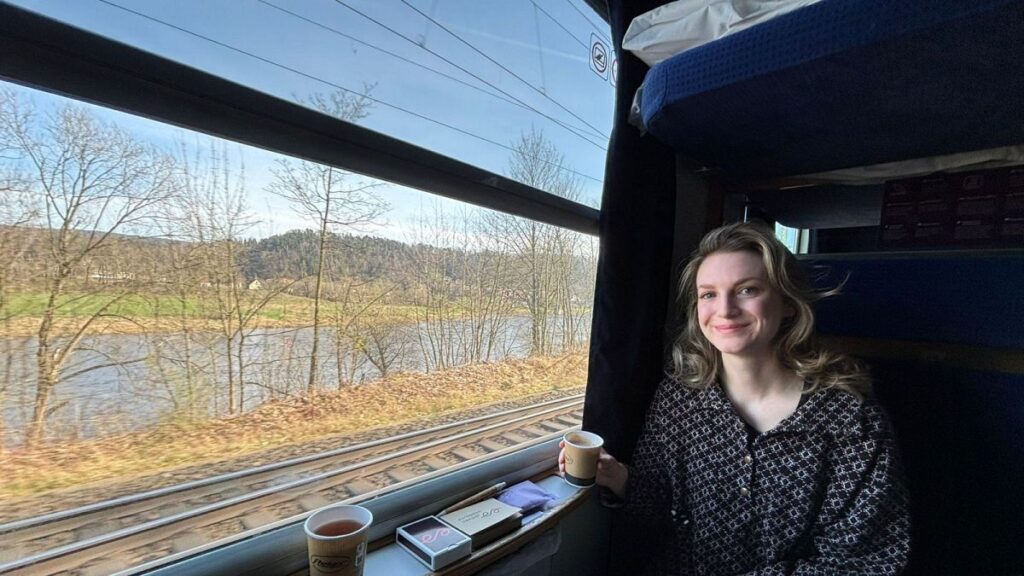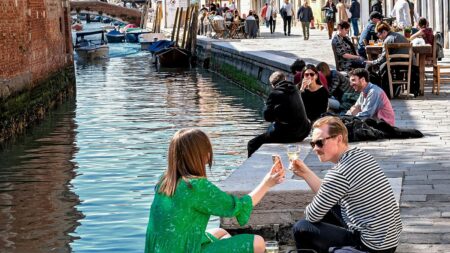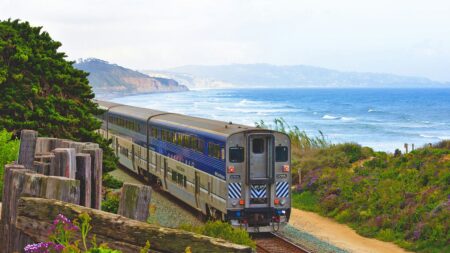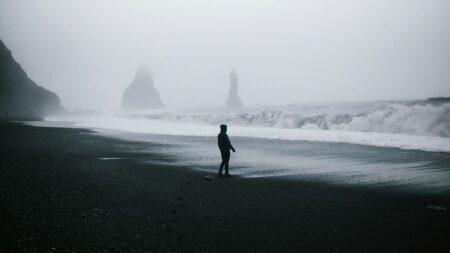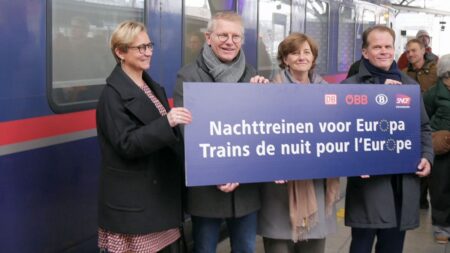Flight-free travel: I passed through six countries in 24 hours and the highest I got was Prague’s 66 metre clock tower.
Standing on the platform at Brussels-Midi station, it’s hard not to smile as the European Sleeper rolls in.
The night train is composed of 15 old carriages rented by a start-up of the same name, one of a few new private operators aiming to fashion Europe’s rail renaissance.
This will be its first journey to Prague – extending a line that has been taking travellers to Berlin via Amsterdam and back since May 2023.
It’s not with a trainspotter’s flashes of recognition that I’m greeting the rolling stock, but a childlike swell of joy at their jumbledness. Radish purple, fluted steel, yellow and blue coaches, all threaded together from different countries and decades.
The European Sleeper is a solid embodiment of its own mission: a more connected continent, in which the future of sustainable travel resembles the past. Can it really revive the golden age of rail travel? I step on board to find out.
Can you get a good night’s sleep on the European Sleeper?
Cards on the table, I was already a sleeper train fan when I boarded the 7.22pm service from Brussels on Monday. A previous trip on the UK’s Caledonian Sleeper convinced me that it’s an efficient and elegant way to travel as well as a climate considerate one.
Cue the obligatory expectation management that they don’t all have the old-world glamour of the Orient Express. And there’s no point pretending you get a perfect night’s sleep either. We all have our idiosyncrasies, and there’s some juddery points along the track that would test even the deepest dreamers.
My bed for the night is in a five-person couchette on a former Deutsche Bahn carriage from the 90s. Luckily I’m only sharing with one other person, a lovely Dutch woman, so we have the benefits of companionable chats while retaining some personal space.
I take the liberty of upgrading myself from the lower bunk to the upper one on my side of two, which folds down and is held by two hooks. On the other side, the top bunk of three (a little higher than mine) is already in situ, with the option to fold out a middle bed. A ladder stored under the seats fastens onto a bar over the window, giving a leg up to sleepers.
My perch is just low enough that I can look out the top of the window if I’m lying flat on my front. And it’s like this that I take in the bright lights of Berlin (a city I’ve yet to step foot in) on the return journey around 11pm.
There are some jolts along the way in both directions, but not ones that make your stomach drop like when you’re strapped into a plane. “Dear traveller” announcements from the train manager – paused during the small hours – reassure us we’re in safe hands along the 1,300 kilometre stretch to Prague.
We get into the Czech capital a little later than planned after a 50 minute delay outside Berlin, around 16 hours after leaving Brussels.
What facilities are there on the European Sleeper?
It’s a no frills operation: no shower, no WiFi, and as yet no dining car – since these are expensive to run, and would take up a carriage that could otherwise hold paying passengers.
My Eurostar from London to Brussels gives me a leisurely window in which to get dinner beforehand. On recommendation from the Man in Seat 61 – train world royalty who I’m delighted to discover is also on this maiden journey – I head to the closeby Pullman Hotel bar.
The European Sleeper does have a short menu of snacks, including nacho chips and noodles. An attendant based in each carriage can bring you drinks until 11pm. And there’s a generous breakfast package of croissant, yoghurt, juice and coffee.
Bathroom wise, there are two toilets and a couple of wash basin compartments at either end of the carriages. The roomier sleeper cabins come with their own sinks too.
I’d recommend bringing sliders or slippers, hand sanitiser, and of course a comfy eye mask and ear plugs.
How much does the European Sleeper train cost?
There’s a range of options on board European Sleeper’s ‘Good Night Train’, starting at €49 for a seat. But a spot in a sleeper car will afford you a much better chance of getting a restful night.
Couchettes come in either standard five-bed or comfort six-bed sizes, dynamically priced at €69 upwards.
Most deluxe are the sleepers which have a maximum of three beds per compartment, from around €108. These are made up with mattresses and duvets – whereas the couchettes just have a sleeping-bag style sheet and pillow, but my set-up was comfy enough.
For solo travellers, couples and families wanting privacy, there’s also the option to book out both kinds of sleeper berths at a higher price.
It’s not for everyone; there are no wheelchair accessible compartments, and it feels like a youngish person’s game. This sleeper is ideal for people wanting to make friends, bonding over the couchettes’ complimentary deck of playing cards, or sipping cava in the narrow corridor.
What’s so special about sleeper trains?
15 hours by rail sounds long, compared to the 90 minutes it would take to fly between Brussels and Prague. But the real beauty lies in passing through rather than skipping over places.
As much as I like the snug interiors of the European Sleeper, the Elbe Valley steals the show.
Waking just outside Dresden to a stream of allotment gardens, I’m enjoying a cappuccino by the time we join the course of this mighty river through Saxon Switzerland. In the spring sunshine, you can pick out the yellow plants on the sandstone mountains, and stick figures on the Bastei bridge.
It’s a form of travel that begets travel, as I’m now keen to return to this glorious national park near Bad Schandau, a place not previously on my radar. Our train guard informs us we’ve passed into the Czech Republic; no one told the Elbe.
This seamless travel makes a blur of everyday scenes – cyclists and dog kennels and tank guns pointing eastward on the tracks at Děčín. I can’t make sense of all these snapshots, but latching onto the details wakes my brain up faster, and I arrive at our destination feeling better for it.
Prague, our guide tells us on a whistle-stop tour of its magnificent spires and doors, is a city long beloved by artists.
It makes me happy to think of those who will feel inspired reaching or departing the city by sleeper train, the connections forged, the books read, poems written and dreams dreamt.
The writer was a guest of European Sleeper on the Good Night Train.
Read the full article here


